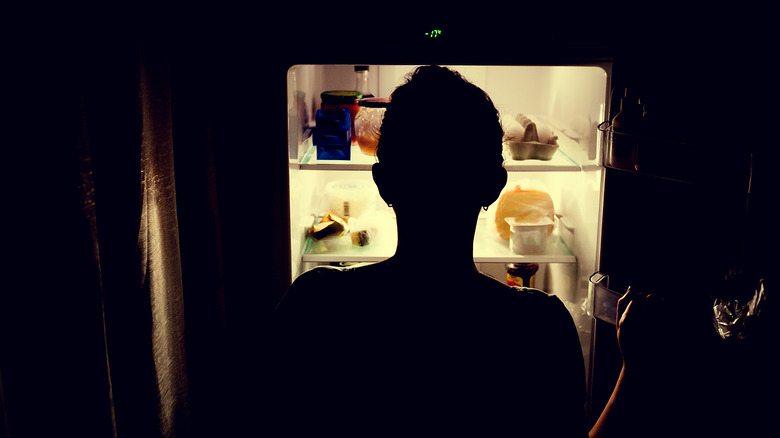New Study Shows Eating Late At Night May Actually Make You Hungrier
Next time you're cooking a healthy dinner, keep an eye on the clock. According to a new study, what you consider "dinnertime" can make a big difference in your health. A lot of surprising (or, at least, compelling) information has surfaced in recent months that has put people's preconceived health beliefs into question. Per The Federal Register, the FDA is about to label eggs as "healthy" despite an age-old back-and-forth about cholesterol content. Another study published in "Trends in Cardiovascular Medicine" last month found that refined grains might not be bad for you. It's a lot of news to digest, pun intended.
Now, a new study shows eating late at night may make you hungrier. It's no secret that the "late-night snack" is a notorious "no-no" to nutritionists. As the study's senior author Frank A. J. L. Scheer, Ph. D., Director of the Medical Chronobiology Program in Brigham and Women's Hospital's Division of Sleep and Circadian Disorders, explained, "Previous research by us and others had shown that late eating is associated with increased obesity risk, increased body fat, and impaired weight loss success." According to the CDC, from 2017-March 2020, 41.9% of U.S. adults were considered obese, a substantial increase from the 30.5% obesity rate in 1999-2000. This puts folks at a higher risk for developing heart disease, type 2 diabetes, and stroke — which have all been linked to late-night eating. The goal of this study, says Scheer via ScienceDaily, was to understand why.
Try to wait until breakfast
The study, published earlier this week in "Cell Metabolism," found that late-night eating can do a lot more than just temporarily curb your appetite. Researchers strictly regulated the calorie intake, meal schedule, and sleep schedule of 16 subjects with an "overweight" or "obese" BMI, per ScienceDaily. Then, the participants followed the exact same procedure but bumped it back by four hours. (If lunch was eaten at noon during the first round of testing, it'd be eaten at 4:00 p.m. during round two.) The difference was massive. Nina Vujović, Ph.D., of Brigham and Women's Hospital Division of Sleep and Circadian Disorders, explains, "In this study, we asked, 'Does the time that we eat matter when everything else is kept consistent?' And we found that eating four hours later makes a significant difference for our hunger levels, the way we burn calories after we eat, and the way we store fat."
Researchers concluded that late-night eating decreases the ability to burn calories, impairs sleep, decreases energy, and causes the body to hold on to fat (via ScienceDaily). Your midnight snack might not even be satisfying your hunger. Late-night eating measurably altered appetite-regulating hormones leptin and ghrelin, says the study, effectively making people hungrier. Whether this increased obesity risk is due to an affected appetite or by a decreased overall amount of energy during waking hours, the researchers say is yet unclear. But, whatever the case, it's worth keeping in mind during your next late-night craving.

